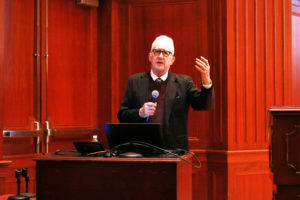By Julia Meehan
Staff Writer
In the ninth installment of the Fall 2018 Faculty Lecture Series, the School of Arts and Communication showed a presentation titled, “What Shapes Human Rights Coverage? What Journalists Wish They Had Learned in College,” in the Mayo Concert Hall on Nov. 16.
John C. Pollock, an author and professor of communication studies at the College, also has experience teaching at Rutgers University, New Brunswick and the City University of New York at Queen’s College.
Pollock’s lecture focused on coverage of human rights issues in the media, and his own academic journey. During the lecture, he gave advice to students looking to follow their passion for writing and reporting.
While on the subject of human rights communications and its media coverage, a topic on which he has written five books, he spoke about traditional human rights issues like fighting authoritarianism and military critique, and about emerging human rights topics like women’s and LGBTQ+ rights.

Pollock also spoke about several theories regarding media coverage and human rights issues, most notably the “buffer pattern” of media coverage. The buffer pattern describes a correlation between the amount of responsibility the government claims for a problem and the amount of media support and favorable coverage it receives, according to Pollock.
He challenged the idea that journalists should be dispassionate and seek both sides of an argument. Rather, he believed that journalists should defend human rights, especially the rights of minorities.
In order for Pollock to find his calling as a writer and professor, he had to face many societal obstacles along the way. He recalled his own upbringing and his life as a college student, and he criticized the social expectation that men had to pursue a career in the sciences and that it was less acceptable for them to study humanities.
He eventually rejected this idea and changed his major from physics to political science. He approached the topic of majors and life plans as prototypes to improve for the future.
“I was not going to become a rocket scientist, and that was a bit discouraging,” Pollock said. It was hard for him to accept that he did not have to fit the mold that gender roles emphasized at the time.
For Pollock, the idea of choosing a career path as a college student was similar to the obstacle many heroes face in Greek mythologies. The protagonists in those stories often have to slay a monster or defeat some sort of evil in order to realize their full potential. The same, he explained, goes for students looking to set out on their own rite of passage –– it’s not about fulfilling the dreams of family or society — it’s about finding an individual course to follow.
“You often have to slay the idea of someone else’s dream for you to discover yourself,” Pollock said.







